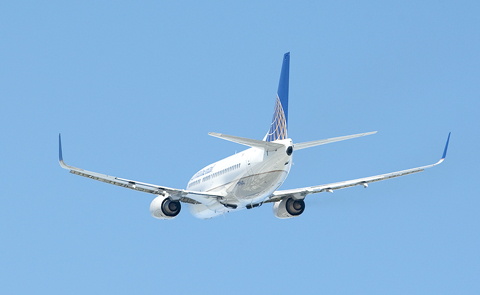Boeing Co chief executive officer Jim McNerney said the US government should work on breaking down global trade barriers to help US businesses compete and hire more workers.
“We all benefit from more trade,” McNerney said during a forum at the Hilton Chicago sponsored by Northwestern University’s Kellogg School of Management.
Boeing cut 9,300 jobs last year and the company yesterday told more than 1,000 employees that their positions would be terminated as of April 23. The number of Americans filing first-time claims for unemployment insurance unexpectedly increased last week, pointing to an uneven recovery in the labor market.

PHOTO: BLOOMBERG
McNerney, who attended a jobs summit at the White House in December, said any jobs plan should focus on education, taxes and trade policy. He urged US President Barack Obama to lock down trade agreements with South Korea, Panama and Colombia as US competitors move forward with their own pacts.
“We need the government’s help to both break down trade barriers and enforce international agreements,” he said.
McNerney also emphasized the importance of innovation and education to US companies operating in the global marketplace. Chicago-based Boeing employs almost 160,000 people and some of the jobs wouldn’t exist if the company wasn’t internationally competitive, he said.
“We are a high-tech exporter,” he said.
McNerney said Boeing must continue to focus on innovation and productivity to stay ahead of Chinese competition. China is the world’s fastest-growing air-travel market and the 168-seat C919, built by a state-controlled company, is expected to make its maiden flight in 2012.
“We now can make airplanes in a way that no one else can make them,” he said. “That will be relevant for the next 50 or 60 years.”
He said Boeing “stumbled some” on the development of the 787 and the 747-8 and said other new programs, such as a version of the F/A-18 that allows for electronic jamming, have been successes. The company also has reached targets on its P-8 program, a customized 737 to be used by the US Navy for maritime patrol, he said.
“We hit more new product milestones last year than any time in our history,” McNerney said.
About half of the 1,000 layoffs announced today are for workers based in the company’s Seattle-area manufacturing hub, and most of the notices went to engineers and information- technology employees, spokesman Tim Healy said.
McNerney has said the company would exceed the target of 10,000 job cuts that wasn’t quite reached last year. Healy said there’s no specific goal for 2010 employment and that it could increase in the first half and then decline later this year as development programs — the 787 Dreamliner and the 747-8 jumbo jet — enter production.
“This year it’s much more of a return to making sure our staffing meets our needs, whereas last year the reductions were closely linked to what was going on with the economy,” Healy said yesterday.

SEMICONDUCTORS: The German laser and plasma generator company will expand its local services as its specialized offerings support Taiwan’s semiconductor industries Trumpf SE + Co KG, a global leader in supplying laser technology and plasma generators used in chip production, is expanding its investments in Taiwan in an effort to deeply integrate into the global semiconductor supply chain in the pursuit of growth. The company, headquartered in Ditzingen, Germany, has invested significantly in a newly inaugurated regional technical center for plasma generators in Taoyuan, its latest expansion in Taiwan after being engaged in various industries for more than 25 years. The center, the first of its kind Trumpf built outside Germany, aims to serve customers from Taiwan, Japan, Southeast Asia and South Korea,

Nvidia Corp chief executive officer Jensen Huang (黃仁勳) on Monday introduced the company’s latest supercomputer platform, featuring six new chips made by Taiwan Semiconductor Manufacturing Co (TSMC, 台積電), saying that it is now “in full production.” “If Vera Rubin is going to be in time for this year, it must be in production by now, and so, today I can tell you that Vera Rubin is in full production,” Huang said during his keynote speech at CES in Las Vegas. The rollout of six concurrent chips for Vera Rubin — the company’s next-generation artificial intelligence (AI) computing platform — marks a strategic

Gasoline and diesel prices at domestic fuel stations are to fall NT$0.2 per liter this week, down for a second consecutive week, CPC Corp, Taiwan (台灣中油) and Formosa Petrochemical Corp (台塑石化) announced yesterday. Effective today, gasoline prices at CPC and Formosa stations are to drop to NT$26.4, NT$27.9 and NT$29.9 per liter for 92, 95 and 98-octane unleaded gasoline respectively, the companies said in separate statements. The price of premium diesel is to fall to NT$24.8 per liter at CPC stations and NT$24.6 at Formosa pumps, they said. The price adjustments came even as international crude oil prices rose last week, as traders

Taiwan Semiconductor Manufacturing Co (TSMC, 台積電), which supplies advanced chips to Nvidia Corp and Apple Inc, yesterday reported NT$1.046 trillion (US$33.1 billion) in revenue for last quarter, driven by constantly strong demand for artificial intelligence (AI) chips, falling in the upper end of its forecast. Based on TSMC’s financial guidance, revenue would expand about 22 percent sequentially to the range from US$32.2 billion to US$33.4 billion during the final quarter of 2024, it told investors in October last year. Last year in total, revenue jumped 31.61 percent to NT$3.81 trillion, compared with NT$2.89 trillion generated in the year before, according to